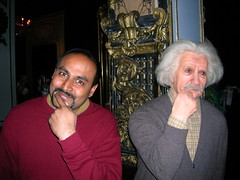
I finished William Dalrymple's "From the Holy Mountain" a couple of days before heading off on our Europe trip. Its a difficult but a very good book. He did a long trip (some months) travelling through several middle east countries -- Turkey, Syria, Israel , Lebanon, Egypt. He was following in the footsteps of a Christian monk called John Moschos who did such a trip long ago and wrote a book about it called Spiritual Meadows. What prompted Dalyrymple to do the trip was the current precarious state of the native Christianity of the middle east. Christianity flourished in the areas at points in the past, and at other points it lived there in harmony with Islam and other faiths. Now in most places militant Islamic fundamentalists are persecuting the local christians in terrible ways. Its a sad and fascinating story and one well worth attention.
Anyway. The book contains many meliflous and nice-sounding words that one normally doesn't come across as they are related to specific christian or muslim religious or secular practice. I thought it would be worth listing some of them with their meanings:
chador: Muslim woman's veil. Can involve anything from a headscarf to a fully-fledged tent. Also known as 'hijab'
Copt: A native Egyptian Christian. The Egyptian Coptic church broke off from the Orthodox mainstream after rejecting the theological decisions of the Council of Chalcedon (451 AD)
fellahin: Egyptian peasant farmers. Plural of fellah
gelabiya: Long arab gown. Alternatively rendered as jellaba. I saw a dress worn by many arabs at Doha airport and I think it was this dress.
Haredim: Ultra-orthodox Jews
keffiyeh: Checkered Arab headscarf, particularly associated with Palestinians. Yasser Arafat used to wear it, and again I saw many at Doha airport.
lavra: Today lavra is a title that can be given to any large Orthodox monastery, but originally it referred specifically to those organised on the idiorrhythmic method: a collection of detached monks' cells clustered around a monastic church. The monks would generally meet only once a week when they would celebrate the Sunday liturgy together; otherwise they lived as semi-independant hermits.
Maronite: An Eastern Christian church, originally based in Syria, though for many centuries located mainly in Lebanon.
mihrab: prayer niche in mosques, indicating the direction of Mecca.
minyan: the minimum quorum of adult males withouth which Jews may not celebrate the more solemn prayers and rituals in a synagogue.
misericord: Projecting ledge on the hinged seat of a western choirstall, serving as a support to a standing singer
Monophysite: the belief that there is only one divine nature in the person of Christ as opposed to the Orthodox position that Christ has a double nature at once human and divine.
narthex: railed-off western portico or antechamber to the main body of an orthodox church, for the use of women, penitents, and catachumens.
shabab: literally 'young men' in Arabic, now generally used in the English-language press to refer to the young stone-throwers of the palestinian intifada
simandron: The wooden stick 'rung' in Eastern christian monasteries to summon the faithful to prayer. Introduced after the advent of Islam , when Christians were forbidden from ringing bells.
stylite: Byzantine monk or hermit who, following the example of St. Symeon Stylites, chose to live on top of a pillar. St Symeon originally mounted his pillar to stop pilgrims attempting to pluck hairs from his cloak or person, but subsequent stylites chose to live up pillars as a specific form of rigorous ascetism. Stylitism remained most popular in the vicinity of Antioch where, in the fifth and sixth centuries ad., pillars dotted most of the highest hilltops.
Surinani: the name given to the Syrian orthodox community in Turkey and Syrian (this is the same church that has branches in Kerala)
tell: a mound covereing an archeological site
tetrapylon: a ceremonial arch with openings on all four sides
wadi: arabic for valley. A riverbed or gorge usually dry except in the wet season
wahde: arabic for 'gently'
==
And three more whose meanings I don't know so well -- they are all related to the daily life of prayer of monks in monasteries : vespers, compline, matins


0 Comments:
Post a Comment
<< Home